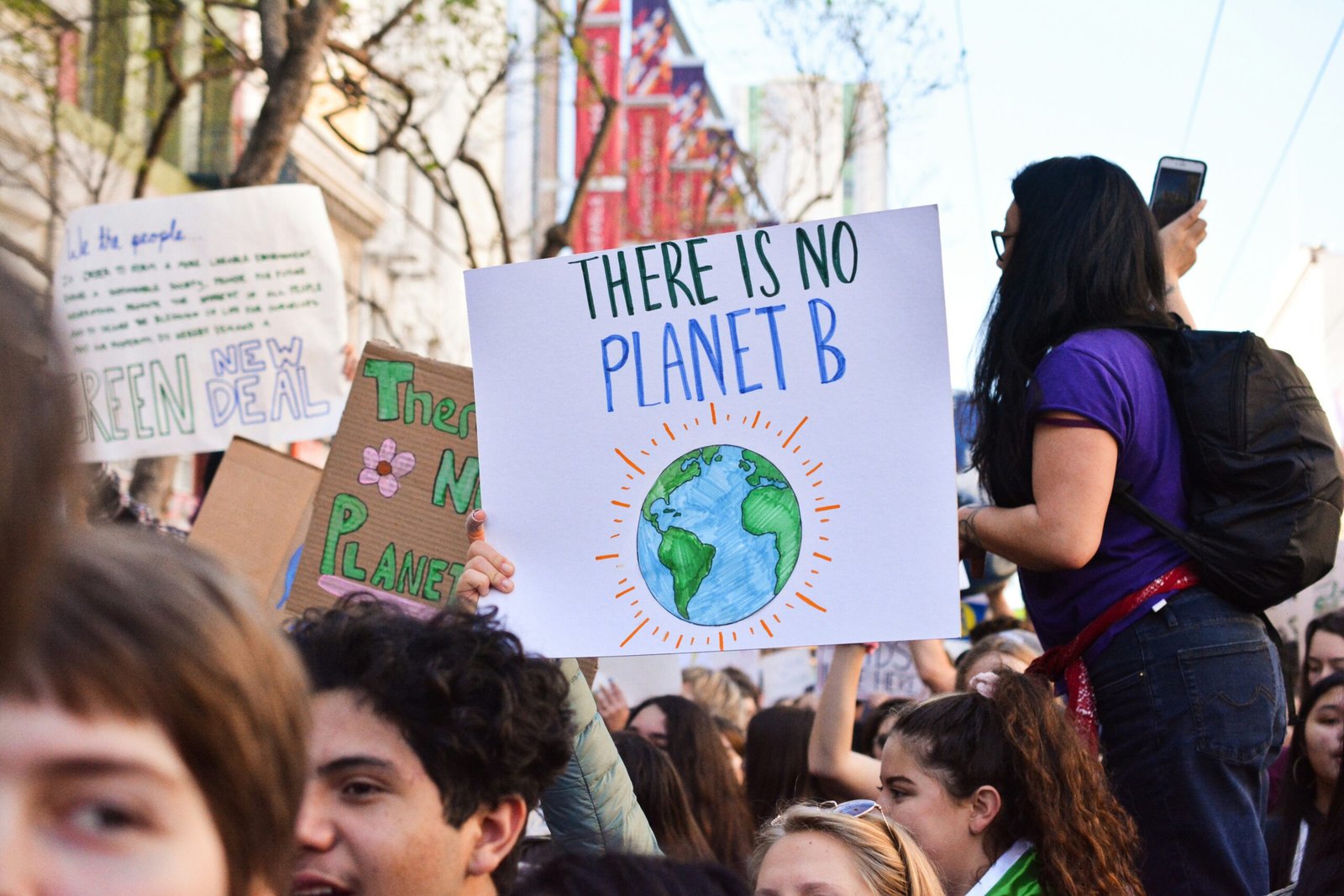Climate Change and Mental Health
Climate change is an ever-present global challenge that extends far beyond the realm of environmental degradation; it significantly impacts human mental health as well. The burgeoning intersection between climate change and mental health has become particularly salient in recent years, as the effects of an increasingly volatile climate manifest more broadly. This connection is exemplified by terms such as “climate anxiety” and “environmental stressors,” which underscore the growing psychological distress linked to climate phenomena.
Climate anxiety, also known as eco-anxiety, refers to the chronic fear of environmental doom. According to a 2021 survey conducted by the American Psychological Association, nearly 70% of respondents expressed concerns about the potential impact of climate change on their mental health. This prevailing sense of anxiety stems from increasing exposure to climate-related disasters, such as hurricanes, wildfires, and floods, which not only devastate the physical environment but also create lasting psychological trauma for those affected.
Moreover, environmental stressors, including the unpredictability of weather patterns and the gradual deterioration of ecosystems, exert profound psychological pressures. Research from the Lancet Planetary Health journal highlights that individuals residing in areas prone to extreme heatwaves and prolonged drought are at heightened risk of experiencing stress, depression, and anxiety disorders. These environmental changes can disrupt daily routines, diminish community cohesion, and exacerbate per-existing mental health conditions, thereby fostering a landscape of pervasive psychological distress.

The implications of climate change for mental health are compounded by social and economic disparities, as marginalized communities often bear the brunt of environmental hazards. For example, the World Health Organization reports that low-income and indigenous populations are disproportionately affected by climate-induced mental health issues due to limited access to resources, social support, and healthcare services.
Understanding the intertwined relationship between climate change and mental health is critical to comprehensively addressing the challenges posed by a hotter, harsher world. This introductory exploration sets the stage for a deeper dive into the multifaceted ways in which climate change influences mental well-being, and underscores the urgency of developing adaptive strategies to mitigate these impacts.
Climate Anxiety: Understanding the Basics
Climate anxiety, a term that has gained traction in recent years, refers to the chronic fear of environmental doom. As climate change increasingly becomes a focal point of global discussions, more individuals are experiencing heightened anxiety over the future of our planet. This form of anxiety manifests in a variety of ways, ranging from persistent worry about climate events to a sense of hopelessness and helplessness about the planet’s deteriorating condition.
Common symptoms of climate anxiety include overwhelming feelings of dread, intrusive thoughts about climate disasters, sleep disturbances, and even physical symptoms such as headaches and a heightened heart rate. According to a study published in the journal Nature Climate Change, young people, particularly those aged 16-25, are among the demographics most affected by climate anxiety. This age group often articulates a deep-seated concern over the long-term impacts of climate change on their futures.
Several triggers contribute to the prevalence of climate anxiety. Key among these are the increasing frequency and intensity of natural disasters such as wildfires, hurricanes, and floods reported by major news outlets. Additionally, alarming scientific reports, like those from the Intergovernmental Panel on Climate Change (IPCC), underscore the severe and irreversible damage climate change poses if not urgently addressed. Social media can also amplify these triggers by exposing individuals to a constant stream of unsettling climate-related content.
In understanding climate anxiety, it is essential to consider its broader sociology-economic and cultural dimensions. For instance, communities that are directly impacted by climate change—such as coastal towns facing rising sea levels—often experience heightened levels of anxiety. Similarly, individuals who feel a strong sense of connection to the natural environment, including environmental activists and indigenous populations, are more likely to report symptoms of climate anxiety.
Research highlights the importance of addressing climate anxiety to mitigate its mental health implications. The intersection of climate change and mental health is a growing area of interest among psychologists and climate scientists alike, emphasizing the need for comprehensive strategies to support those affected as the world faces an increasingly uncertain ecological future.

Environmental Stressors and Their Psychological Effects
Climate change is not just an environmental issue; its impacts are profoundly interwoven with various aspects of human life, including mental health. Environmental stressors, such as extreme weather events, rising temperatures, and natural disasters, can have dire psychological effects on individuals and communities. Increasingly frequent and severe weather events, like hurricanes, floods, and wildfires, disrupt lives, leading to the loss of homes and livelihoods. This disruption often results in acute stress reactions and post-traumatic stress disorder (PTSD) in affected populations.
Rising temperatures exacerbate existing mental health issues and contribute to new ones. Hotter climates have been linked with increased aggression and violence, elevated anxiety levels, and greater incidence of mood disorders. Moreover, heatwaves can exacerbate conditions like depression and bipolar disorder, contributing to a heightened risk of mental health emergencies. A study conducted in the southern United States found a correlation between heat exposure and increased hospital visits for mental health-related reasons, underscoring the significant impact of rising temperatures.

Natural disasters, another consequence of climate change, present severe mental health challenges. Survivors of these events often grapple with grief, anxiety, and PTSD. For instance, the aftermath of Hurricane Katrina in 2005 highlighted how affected individuals exhibited symptoms of severe depression and PTSD years after the disaster. In another example, the prolonged droughts in Australia have led to what is termed “eco-anxiety,” a chronic fear of environmental doom, particularly affecting the farming communities whose livelihoods are directly impacted by climatic changes.
Case studies indicate that these environmental stressors disproportionately affect vulnerable populations, including children, the elderly, and those with pre-existing mental health conditions. For example, following the 2019-2020 Australian bushfires, many children exhibited signs of psychological trauma, necessitating long-term mental health support. Similarly, communities rebuilding after disasters often face long-term mental health challenges, requiring sustained intervention and support mechanisms.
In summary, the intricate link between environmental stressors and mental health necessitates a multi-faceted approach for addressing these challenges. Acknowledging and integrating mental health considerations in climate action plans becomes essential to mitigate the psychological impacts of a hotter, harsher world. By investing in robust mental health services and building resilient communities, societies can better prepare for and respond to the mental health crises precipitated by climate change.
Personal Stories: The Human Face of Climate Change
The impacts of climate change extend beyond physical environments, seeping into the mental well-being of individuals. Personal narratives reveal the multi-faceted issues arising from a rapidly changing climate.
Sarah, a farmer from California, offers a poignant account of her struggles. “My family has cultivated this land for generations, but the increasing severity of droughts has made it nearly impossible to sustain agriculture. The financial strain and the constant fear of losing everything have taken a significant toll on my mental health,” she shares. Sarah’s experience is a testament to how climate change affects not only livelihoods but also psychological wellness.
In coastal Bangladesh, residents like Amin face different yet equally challenging conditions. Displacement due to rising sea levels has forced Amin and his family to leave their ancestral home. “Living in makeshift shelters, we are constantly on edge, worrying about the future. It’s hard to find a sense of stability or peace. Many in our community are falling into depression and anxiety,” Amin explains. His story underscores the emotional suffering tied to climate-driven displacement.
Across the globe, in Australia, Sophia, a young environmental activist, speaks about the mental burden of confronting climate change head-on. “While advocating for environmental protection, I’m frequently overwhelmed by the enormity of the crisis. It feels like an uphill battle, and the sense of urgency sometimes spirals into anxiety and burnout,” she confides. Sophia’s narrative illustrates the mental health challenges faced by those who are on the front lines of climate activism.
These diverse testimonials highlight a crucial truth: the mental health impact of climate change is profound and far-reaching. By sharing these personal stories, we can better empathize with those affected and recognize the urgent need to address the psychological dimensions of climate change as we strive for broader solutions.
Coping Mechanisms and Strategies for Climate Anxiety
Climate anxiety, a type of stress related to climate change, is increasingly prevalent as individuals confront the tangible and existential threats posed by a deteriorating environment. Managing this anxiety effectively requires both personal resilience and communal support systems.
Firstly, individual coping mechanisms are essential. Mindfulness practices, such as meditation and yoga, can be profoundly beneficial. According to the American Psychological Association, these techniques help individuals stay grounded and reduce overall anxiety levels. Regular physical activity also contributes significantly to mental well-being, providing an outlet for stress and fostering a sense of accomplishment.
Cognitive-behavioral strategies are recognized for their efficacy in managing anxiety. Challenging catastrophic thinking with balanced, fact-based perspectives allows individuals to reframe their anxieties constructively. Additionally, therapeutic approaches like talk therapy or participation in support groups can offer emotional outlets and facilitate peer-based understanding and support.
Community-based approaches play a crucial role in mitigating climate anxiety. Collective action, such as joining environmental advocacy groups or participating in local sustainability initiatives, fosters a sense of agency and collective efficacy. According to Mental Health America, community involvement enhances resilience by creating social bonds and shared purpose. Educational programs and workshops can also empower communities with the knowledge and resources to adapt to climate challenges proactively.
Engaging with trusted mental health organizations for guidance can further streamline coping efforts. For instance, the National Institute of Mental Health recommends seeking professional help when climate anxiety becomes overwhelming, ensuring that individuals receive tailored, effective support.
| Coping Strategy | Effectiveness |
|---|---|
Mindfulness and Meditation | High |
Physical Activity | Moderate to High |
Cognitive-Behavioral Therapy | High |
Community Involvement | Moderate to High |
Professional Counseling | High |
Incorporating these strategies into daily life not only addresses individual mental health needs but also strengthens communal resilience against the broader impacts of climate change. By cultivating both personal and collective coping mechanisms, individuals and communities can navigate the mental health challenges presented by a hotter, harsher world more effectively.
The Role of Community and Support Systems
The interconnections of mental health and community well-being is undeniable, particularly in the context of climate change. As global temperatures rise and environmental conditions deteriorate, the mental health challenges associated with these changes are increasingly evident. Community cohesion and support systems have emerged as vital components in mitigating these challenges, highlighting the importance of collective resilience and mutual aid.
Communities that foster strong social networks can provide emotional, psychological, and practical support to individuals facing climate-related distress. Initiatives that promote social engagement and solidarity are crucial in this regard. Informal networks, like neighborhood groups, faith-based organizations, and local clubs, often serve as primary lines of defense against the emotional toll of climate catastrophes. These groups can disseminate information, offer immediate support, and mobilize communal resources in response to crises.
Formal programs also play an essential role. Community-based mental health services, such as counseling centers and crisis intervention teams, offer professional support to those grappling with anxiety, depression, and trauma exacerbated by climate events. Programs like Climate Resilience Hubs and local disaster response networks provide comprehensive support, ranging from mental health resources to logistical assistance. These hubs often function as centralized points where residents can access multiple forms of help, ensuring a coordinated and effective response to climate-induced stressors.

Further amplifying community resilience are support groups specifically tailored to address climate anxiety. These groups, whether in-person or virtual, provide safe spaces for individuals to express their fears and frustrations, fostering a sense of shared experience and collective healing. Organizations such as the Good Grief Network and Climate Psychiatry Alliance offer established support frameworks and resource directories for individuals seeking community-based mental health support.
To explore more about community support systems and mental health resources in the context of climate change, readers can visit high-authority sites like the American Psychological Association (APA) and the Mental Health and Climate Change Alliance (MHCCA). These platforms offer extensive information on programs, support networks, and practical steps to build community resilience.
Future Outlook: Preparing for a Hotter, Harsher World
The future undoubtedly presents significant challenges as we continue to navigate the realities of climate change. The intertwining of environmental changes with mental health necessitates a multi-faceted approach. Current research is pivotal in identifying how rising temperatures and more frequent natural disasters exacerbate mental health conditions, from increased anxiety to post-traumatic stress disorder. Organizations worldwide are conducting studies to understand these correlations better and to forecast future mental health scenarios under worsening climate conditions.
In response to these projections, potential policies are being formulated to address the issue at both the macro and micro levels. Governments are increasingly aware of the need for comprehensive climate action plans that incorporate mental health considerations. For instance, urban planning could include green spaces that not only aid in reducing urban heat islands but also provide mental respite for city dwellers. Moreover, policies aimed at enhancing community resilience and ensuring access to mental health services post-disasters are essential.
Beyond policy, innovative solutions are emerging from various sectors. Technological advancements are being leveraged to create early warning systems and real-time tracking of mental health impacts in vulnerable populations. Mobile applications offering mental health support are being tailored to those affected by climate-related stressors. Community-based interventions, such as peer support groups and localized counseling services, are proving invaluable in building mental health resilience amidst climate change.
Proactive measures are crucial in preparing for a hotter and harsher world. Mental health preparedness should not be an afterthought but a central component of disaster management and climate adaptation strategies. Investing in mental health infrastructure, training mental health professionals to deal with climate change-related stress, and integrating mental wellness into public health plans are proactive steps that can mitigate the adverse effects of climate change on mental health. As our environment continues to change, so must our strategies for maintaining mental well-being in a sustainable and resilient manner.
FAQs on Climate Change and Mental Health
How does climate change directly impact mental health?
Climate change can lead to increased instances of extreme weather events, such as hurricanes, floods, and wildfires. These events often cause significant psychological distress, leading to conditions such as anxiety, depression, and post-traumatic stress disorder (PTSD). The disruption of daily life and loss of homes or loved ones further exacerbate mental health challenges.
Can rising temperatures affect mental well-being?
Yes, rising temperatures have been linked to a range of mental health issues. Higher temperatures can increase irritability and aggressive behavior, contributing to higher rates of violence and conflict. Heatwaves can also disrupt sleep patterns, leading to fatigue and cognitive impairment, which in turn affect mental health.
What are the long-term mental health effects of climate displacement?
Individuals displaced due to climate-related events often experience long-term mental health effects, including prolonged stress and anxiety. This displacement disrupts social networks and support systems, making it more challenging to cope with mental health issues. Moreover, the uncertainty and instability associated with displacement can leave lasting psychological scars.
How does climate change affect mental health in children and adolescents?
Children and adolescents are particularly vulnerable to the mental health impacts of climate change. Exposure to extreme weather events can lead to developmental and emotional difficulties. The ongoing stress and anxiety about an uncertain future and the potential disruption of their education and social lives can also affect their long-term mental well-being.
Are there any protective factors to mitigate the mental health impacts of climate change?
Yes, building community resilience and fostering social support networks can help mitigate some mental health impacts. Access to mental health services and education on coping strategies are crucial. Additionally, public policies aimed at reducing the severity of climate change and its effects can play a significant role in protecting mental health.
How can individuals prepare for the mental health impacts of climate change?
Individuals can prepare by staying informed and actively participating in community preparedness plans. Practicing stress management techniques, such as mindfulness and physical activity, can help maintain mental well-being. It’s also essential to build strong social connections and seek professional mental health support when needed.




Leave a Comment